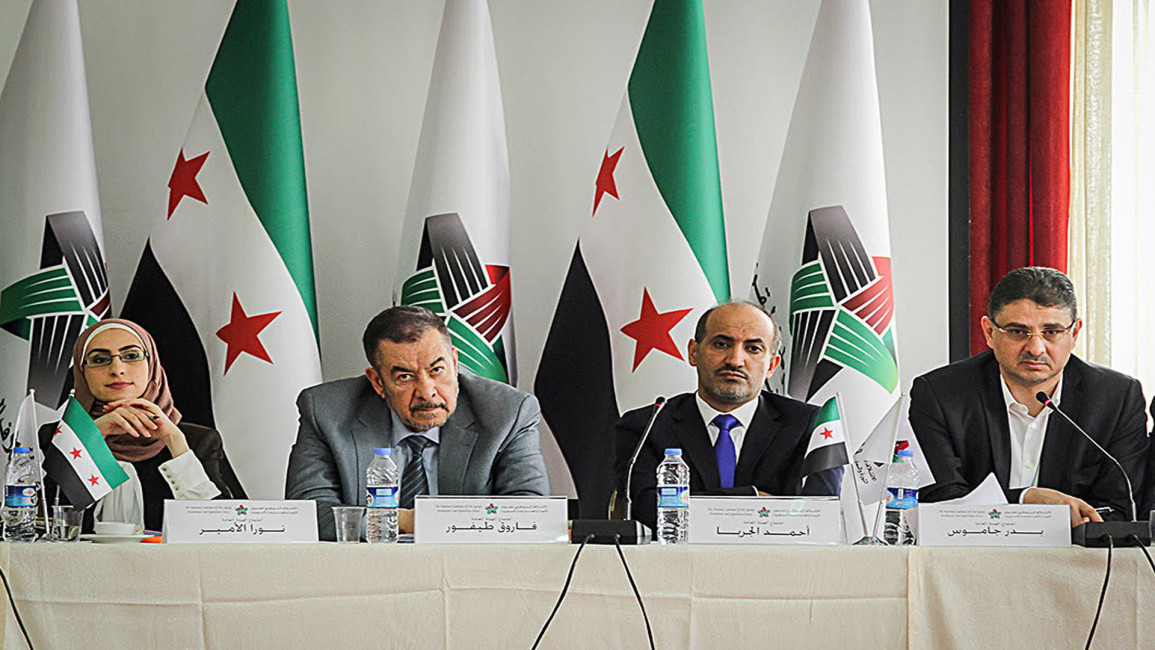
Syria’s opposition is a gift to an authoritarian regime
Syria’s opposition is a gift to an authoritarian regime
A divided coalition, plagued with in-fighting over imaginary spoils, is lending credibility to the administration of President Bashar al-Assad.
5 min read
A divided opposition has surrendered to foreign interests [Getty]
Can authoritarian regimes benefit from having opposition? Yes, if the opposition acts in such a foolish way that inadvertently provides the regime the opportunity to “prove” that its rivals are not a viable alternative.
The National Coalition for Syrian Revolutionary and Opposition Forces is a case in point. By the way it has conducted itself, the coalition has handed the authoritarian Syrian regime continuing power on a silver platter.
However, it should be said that the Syrian regime has worked long and hard to ensure that no coherent opposition could arise. Well before the revolution started, the regime not only suppressed and arrested opposition figures, it obliterated political life in Syria. Similar to other Arab regimes, it banned any form of meaningful political association or civil action. As a consequence
| The coalition has handed the authoritarian Syrian regime continuing power on a silver platter |
, the political experience of the Syrian elite was limited, leaving it incapable of formulating a sound political strategy during the early weeks of the uprising. None this does not exempt the elite from responsibility for failing to build an opposition capable of mobilising vast sectors of Syrian society and providing a viable alternative to the regime.
Six months after the revolution began, Syrian opposition leaders - mostly Islamists - met in Istanbul to declare the establishment of the Syrian National Council, which they described the largest opposition group united against the Syrian regime.
There had been several attempts to postpone the announcement. One left-wing opposition leader called to urge those in Istanbul to wait until further understandings were reached to include more groups under the council’s umbrella. This was vehemently rejected. The opposition in Istanbul complained of pressure to put leftists in leadership positions, which they rejected in no uncertain terms. Harsh words were said.
Third time a charm?
The council was duly declared and regional actors moved quickly to come up with a plan to bridge the gaps between the council and those who had urged it to be more inclusive before its declaration. As a result, a second Syrian National Council was announced on October 2, also in Istanbul, but this time with leftists front and centre.
It was warmly welcomed both regionally and internationally by countries supporting the opposition, but it did not take long for this council to falter. It became necessary to reorder the opposition again, and the National Coalition for Syrian Revolutionary and Opposition Forces was born in November 2012.
The establishment of the coalition illustrates two problems that have beset the opposition from the outset. The first is the ideological and partisan differences among opposition members that developed into personal disputes over coalition posts and seats in the defunct transitional government. These disputes have ultimately weakened the coalition and its role.
Second, regional and international interference - from day one - created further divisions within the coalition, with different groups affiliating with different countries and undermining any independent decision-making ability of the council itself. It also encouraged opportunists to solicit support from friendly countries, dividing that support. Opposition leaders thus ended up competing over financial aid, some even succumbing to the temptation of “personal gifts” such as luxury cars.
A government-in-waiting?
The coalition has also not accomplished anything of note in terms of communicating with the rebel youths inside Syria, and nor did the transitional government establish any physical presence or exert any real effort to govern areas under opposition control. Conflict instead flared within the opposition over imaginary spoils. Furthermore, the coalition and its various members lacked a political strategy to address Syrians in Syria and posit itself as an alternative to the regime. It also failed to address those in Syria who form the social foundation for the regime with messages of conciliation or reassurance.
| The lack of political maturity... rendered the coalition a mere front for regional and international governments |
There was only one strategy, which was to call on the international community to intervene militarily against the Syrian regime. By pursuing just that one aim, the coalition demonstrated that it could not lead the revolution and overthrow the regime from within. It also put itself completely in the hands of regional and international players.
Instead of confronting the Syrian regime on major domestic issues or creating a leadership that derived its legitimacy from its support of the resistance and the liberation of the land, coalition leaders bid ever more desperately for outside favour. One prominent opposition leader promised western countries to end support for all armed movements. Another coalition member went as far as proposing an alliance with Israel.
Credibility
The lack of political maturity and any independent national spirit rendered the coalition a mere front for regional and international governments and their agents. The rebel youths in Syria and the national democratic opposition both inside and outside the country found themselves caught between the regime’s brutal arrogance and the weakness of the coalition, with its internal rivalries and foreign influence. That rivalry and the capitulation to external dictates ultimately forced the head of the coalition, Ahmad Mouath al-Khatib, to resign in March 2013.
This is the opposition to Syria’s regime and such an opposition gives credibility to the Assad administration. The regime can also now stoke fears of the unknown in the absence of a clear alternative.
And much of Syrian society does not trust a divided political opposition that has surrendered to foreign interests.
This is an edited translation from our Arabic edition



